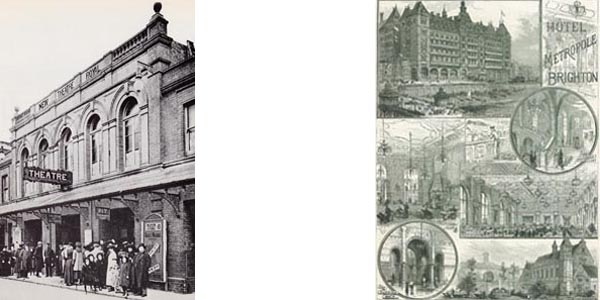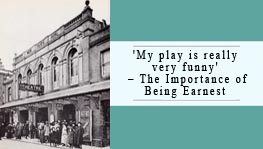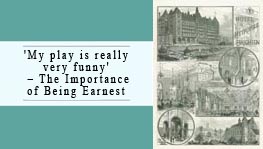
left: The New Theatre Royal in 1909. It was here that Wilde and his elder son Cyril attended a concert on 7 September 1894.
At that time the building was known as the Assembly Rooms.
right: The Metropole Hotel, Brighton – where Wilde and Douglas spent four nights immediately after leaving Worthing – featured in
the Illustrated London News on 26 July 1890.
Chapter 7: 'My play is really very funny' – The Importance of Being Earnest
The seventh chapter is a detailed gathering-together of the available evidence about the process of the composition of The Importance of Being Earnest, together with the relevant dates as far as they are known.
The sources of some of the names Wilde used for his character are examined. There is the interesting case of Bunbury, whose name was almost certainly partially inspired by a report in the Worthing Gazette during Wilde’s stay in Worthing about a magistrate named Bunbury who was wrong-footed by a thief who knew more about sentencing law than the magistrate did.
There is also the intriguing possibility that Lady Bracknell’s name was chosen in reference not only to the Berkshire town where Bosie’s mother lived, but also to an advertisement in the Gazette for a patent preparation called Homocea – while Lady Bracknell’s description of Miss Prism as ‘a female of repellent aspect, remotely connected with education’ was probably an unkind tribute to the ‘horrid, ugly Swiss governess’ who was at the Haven when Wilde arrived there on 10 August.
The chapter also includes a detailed examination of the contradictory claims about what contribution, if any, Bosie made to the composition of Earnest, the conclusion being that the truth probably lies somewhere between Wilde’s and Bosie’s accounts of the matter.
The first mention of the play that was to become The Importance of Being Earnest is in a letter Wilde wrote to the actor-manager George Alexander, probably a week or two before he went down to Worthing.[1] ‘The plot,’ Wilde told Alexander, ‘is slight, but, I think, adequate.’ The outline he gives is very much as in the finished play, although there is no mention of plot devices such as the baby in the handbag; nor does the Ernest / earnest motif yet appear.
Only one character, Miss Prism, has her final name. Algernon at this point is Lord Alfred Rufford, the same name as Wilde gave one of the characters in A Woman of No Importance and confirmation, if any were needed, that the charming and feckless Algy was partly based on Bosie. Jack Worthing is Bertram Ashton, and his fictitious younger brother is not Ernest, but George. Lady Bracknell is the Duchess of Selby. Gwendolen Fairfax is Lady Maud Rifford. Cecily Cardew is Mabel Harford.
Like many of the world’s greatest literary works, including the plays of Shakespeare and the novels of Dickens, The Importance of Being Earnest was a pot-boiler, composed for money by someone who wrote for a living. Wilde’s need for money was at this point urgent. In a letter from Worthing to Charles Spurrier Mason he wrote: ‘I am in a very much worse state for money than I told you. But [I] am just finishing a new play which, as it is quite nonsensical and has no serious interest, will I hope bring me in a lot of red gold.’[2] Wilde hoped that the play might be produced not only by George Alexander but also by the American producer Albert Palmer. Palmer had put on a successful production of Lady Windermere’s Fan in Boston and New York in early 1893, and Wilde told Alexander that Palmer was ‘anxious to have a play from me for the States “with no real series interest” – just a comedy’. Wilde thought that the new play he had in mind would suit Palmer’s purposes, and by the end of October he is telling Alexander that he has had ‘very good offers from America for it’.[3]
Once he arrived in Worthing on 10 August, Wilde must have set to work at once, since by 25 August Constance was able to write to Georgina Mount Temple: ‘Oscar has written a play here, so I love this place now!’
What Wilde had written in the first fortnight, however, can have been no more than an initial draft, since just over two weeks later, on 10 September,[4] Wilde is writing to Bosie to indicate that the play is not yet in its final form:
I have been doing nothing here but bathing and playwriting. My play is really very funny: I am quite delighted with it. But it is not shaped yet. It lies in Sibylline leaves about the room, and Arthur has twice made a chaos of it by ‘tidying up’. The result, however, was rather dramatic. I am inclined to think that Chaos is a stronger evidence for an Intelligent Creator than Kosmos is: the view might be expanded.’[5]
The play was nonetheless sufficiently ‘shaped’ for the first draft to go to Mrs Marshall’s Type Writing Office in the Strand a few days later. Although the original scheme Wilde had outlined to Alexander in July had been for a play in three acts, the play, which had the working title Lady Lancing, by now had four. The completed typescript of the first draft was stamped 19 September,[6] so it is possible that Constance took the manuscript to London with her when she and the children returned to the capital on 12 September.
The typing of the second draft took much of October, with stamps at the end of each act as follows: Act I – 8 October; Act II – 18 October; Acts III and IV – both 25 October.[7]
The reason for these intervals may have been that Wilde was revising the play one act at a time, and sending each act to Mrs Marshall as he finished working on it. If so, the first act was probably dispatched just before Wilde and Bosie left Worthing.
At the end of October Wilde sent Alexander the typescript, explaining that, although Lady Lancing was the title on the cover, the play’s real title would be The Importance of Being Earnest. Lady Lancing was camouflage, there being no character of that name in the play.[8] By now most of the characters had their final names, apart from Algernon Moncrieff, who at that point was Algernon Montford, and Lady Bracknell, who was Lady Brancaster.
The word-play on Ernest / earnest was probably suggested by the publication two years earlier of a volume of poems entitled Love in Earnest by the pederast schoolmaster John Gambril Nicholson.[9] Wilde took much interest in writings of this nature, and since the volume received a certain amount of attention – it was, for example, well reviewed in the Artist, a journal familiar to Wilde and his circle (a poem by Bosie appeared in the April 1894 issue) – it is unlikely that he was unaware of it. In a typical poem in the collection, ‘Of Boys’ Names’, Nicholson runs through the associations that various names have for him, before ending each verse with ‘Ernest sets my heart a-flame’. It is characteristic of Wilde that he thought nothing of the risk of being associated with so compromising a book.
The word-play on Ernest / earnest was probably suggested by the publication two years earlier of a volume of poems entitled Love in Earnest by the pederast schoolmaster John Gambril Nicholson.[9] Wilde took much interest in writings of this nature, and since the volume received a certain amount of attention – it was, for example, well reviewed in the Artist, a journal familiar to Wilde and his circle (a poem by Bosie appeared in the April 1894 issue) – it is unlikely that he was unaware of it. In a typical poem in the collection, ‘Of Boys’ Names’, Nicholson runs through the associations that various names have for him, before ending each verse with ‘Ernest sets my heart a-flame’. It is characteristic of Wilde that he thought nothing of the risk of being associated with so compromising a book.
George Alexander was initially uncertain whether the play was right for him, but the failure of a play by Henry James called Guy Domville – a section of the audience jeered James when he took a bow at the end of the play – meant there was a vacancy at the St James’s Theatre; and Alexander decided to fill it with Earnest. In January 1895 he and Wilde met to discuss the play. Alexander said that he thought the third act of the four-act version superfluous and less good than the rest. Wilde fought for almost an hour to preserve the play as he had written it, but in the end gave way, with a typically Wildean flourish:
The scene that you feel is superfluous cost me terrible exhausting labour and heart-rending nerve-racking strain. You may not believe me, but I assure you on my honour that it must have taken fully five minutes to write.[10]
Wilde duly reduced the play to the three acts originally envisaged. The second and third acts of the four-act version were compressed to form the present second act, and a section featuring a lawyer called Gribsby was cut entirely.
Gribsby turns up at Jack Worthing’s house in Hertfordshire to arrest Algy for debt. In a clear echo of Wilde’s and Bosie’s extravagant dining practices in real life – and Wilde’s own parlous financial situation at the time he was writing the play – Algy has run up a debt of £176 14s 2d (about £17,600 today) dining at the Savoy. If he does not pay up, he will be taken to Holloway prison. The idea of going to a suburban prison appals Algy: ‘‘I really am not going to be imprisoned in the suburbs for having dined in the West End.’
Gribsy tries to be reassuring:
The surroundings I admit are middle class; but the gaol itself is fashionable and well-aired; and there are ample opportunities of taking exercise at certain stated hours of the day. In the case of a medical certificate, which is always easy to obtain, the hours can be extended.
Within nine months or so of writing these lines, Wilde was himself in Holloway prison, which he did not find as fashionable as his fictional lawyer had promised. He was there for a month, from his arrest on 5 April 1895 until the first criminal trial ended on 7 May, when he was given bail after the jury failed to agree. Although Holloway proved not to be fashionable, conditions there were a great deal more pleasant than in the prisons where Oscar was incarcerated after his conviction. Since he was a remand prisoner, he was able to have his own clothes and furniture; and his meals were brought in from a nearby restaurant.
The four-act version of Earnest exists, and is occasionally performed. It was first published in 1903 in a German translation from a typescript which Robert Ross had sent to a German publisher. In 1956 the New York Public Library published the original typescripts and manuscripts, and in 1957 Wilde’s younger son Vyvyan Holland used the German version as a ‘template’ for putting together an English four-act version from the various alternatives in the typescripts and manuscripts.[11]
The long Gribsby section, although amusing in parts, includes some weak exchanges; and much of the dialogue Wilde removed from elsewhere in the four-act version is also not up to the standard of what remains. Alexander was right, and he did both the author and the stage a favour by insisting that Wilde shorten the play.
1. Merlin Holland and Rupert Hart-Davis, eds, The Complete Letters of Oscar Wilde (Fourth Estate, 2000), p. 595. The letter is given the conjectural date ‘? July 1894’, but, since we now know that Wilde went to Worthing on 10 August, an early August date is possible.
2. Complete Letters, p. 603. Charles Spurrier Mason had been – and possibly still was – the lover of Wilde’s co-defendant, Alfred Taylor. See Chapter 8, note 1.
3. Complete Letters, pp. 597 & 620.
4. See Appendix B for the dating of this letter.
5. Complete Letters, p. 602.
6. Melissa Knox, Oscar Wilde in the 1990s: The Critic as Creator (Camden House, 2001), p. 43.
7. Auction catalogue for the sale at Christie's East, 219 East 67th Street, New York on 6 February 1981. The catalogue says of the date for the completion of Act I ‘not 3 October as noted by Dickson’.
8. Complete Letters, p. 620 and footnote.
9. Love in Earnest by Timothy d’Arch Smith (Routledge & Kegan Paul, 1970) gives a detailed account of Nicholson and other pederastic writers of the 1890s.
10. Hesketh Pearson, The Life of Oscar Wilde (Penguin, 1960; first published by Methuen, 1946), p. 252.
11. I am grateful to Donald Mead for providing me with this summary of the history of the four-act version of The Importance of Being Earnest.

